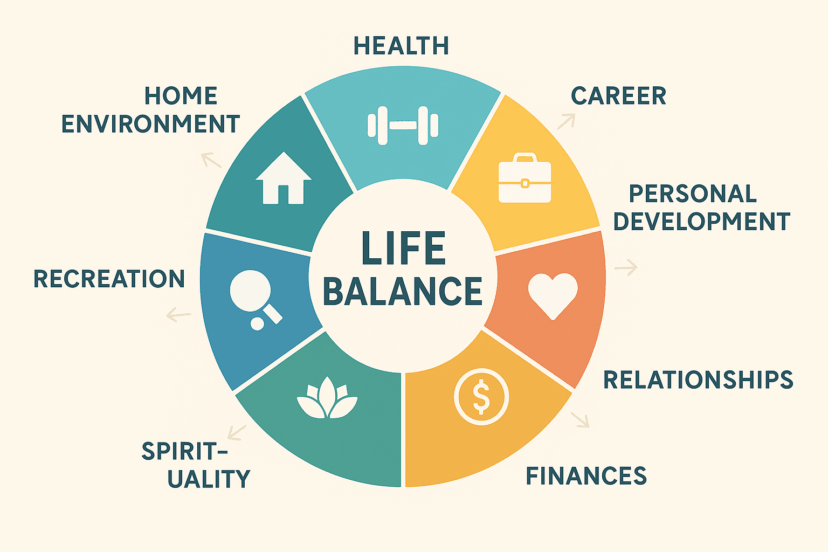Areas of Life for Goal Setting: A Practical Guide to Achieving Balance
We may earn a commission for purchases made using our links. Please see our disclosure to learn more.
When you put a lot of effort into one aspect of your life and saw other aspects of it falter, have you ever felt stuck or out of sync? You’re not by yourself. The majority of people make objectives, but they frequently only concentrate on one aspect of them. You must consider every significant aspect of life when creating goals if you want to achieve true balance and long-term development. You will learn how to get started, where to establish goals, and what to avoid along the way with the guidance of this book.
Why Goal Setting Matters Across Different Areas of Life
You risk developing blind spots if you solely set goals for your health or work. Something will feel strange if you’re doing well at work but struggling at home, or if your finances are secure but you’re ignoring your social life. For this reason, it’s critical to establish goals in several domains. In addition to increasing your level of satisfaction, this strategy allows you flexibility and resilience in the face of life’s changes.
The Core Areas of Life for Goal Setting
Let’s explore the most important areas where intentional goal setting can transform your life.
1. Health and Wellness
Your well-being is the foundation for everything else. This includes physical health, mental health, sleep, nutrition, and stress management. Small, consistent changes—like adding a daily walk or drinking more water—can have big impacts.
2. Career and Professional Growth
Whether you’re looking to move up the ladder, start a side hustle, or simply develop new skills, your professional life deserves attention. Career goals might involve earning a certification, improving productivity, or expanding your network.
3. Personal Development
You may become the best version of yourself by setting personal growth goals. These could focus on learning new skills, practicing self-reflection, building confidence, or developing emotional intelligence.

4. Relationships and Social Life
Our connections matter. Setting goals here might mean nurturing close family ties, making time for friends, or working on communication. Your general level of satisfaction is frequently influenced by the level of quality of your connections.
5. Financial Stability
Financial health brings freedom and peace of mind. Consider setting goals like saving a set amount each month, paying off debts, investing, or tracking your expenses to stay within budget.
6. Spirituality and Inner Growth
For many, spiritual fulfillment is crucial. This might involve meditation, prayer, connecting with nature, or exploring your sense of purpose.
7. Recreation and Hobbies
Downtime isn’t wasted time—it’s essential for creativity and stress relief. Goals here could include learning an instrument, taking up a craft, or scheduling regular getaways.
8. Home and Environment
A supportive environment helps you thrive. This could mean decluttering your space, gardening, redecorating, or even organizing your digital life. For many, embracing a minimalist lifestyle is a practical way to create more calm and focus at home. By reducing clutter and distractions, you make room for what truly matters, which can improve every other aspect of your life.
Scientific Research: Why Goal Setting in All Areas of Life Works
If you’ve ever wondered why setting goals across different life domains leads to real change, science has some compelling answers.
A well-known study published in Frontiers in Psychology explores the concept of life crafting as a tool for purpose and meaning. In this research, participants engaged in exercises that helped them reflect on their values, passions, and future dreams—then set specific goals in those areas. The findings showed that this structured approach significantly increased happiness, well-being, and even personal performance. Writing down your intentions and clarifying your direction truly helps you move forward, no matter which part of your life you focus on.
Another narrative review of life goal mechanisms reinforces the power of holistic goal setting. This comprehensive paper summarizes decades of research, highlighting that meaningful goals don’t just happen in one area—they show up in health, relationships, career, psychological well-being, and even leisure. The review emphasizes that when you set and pursue goals in multiple areas, you’re more likely to feel fulfilled and experience overall life satisfaction.
These scientific insights confirm that balanced goal setting isn’t just a motivational trend—it’s a proven strategy for building a richer, more satisfying life.
How to Set Meaningful Goals in Each Area
Start with self-reflection. Which areas feel strong? Which ones need work? Don’t try to fix everything at once—pick one or two areas to start. Set specific, measurable, and realistic goals. For instance, instead of “get healthier,” try “exercise for 20 minutes, three times a week.” Use the SMART method: Specific, Measurable, Achievable, Relevant, Time-bound.
Write your goals down, break them into smaller steps, and check in with yourself regularly. Adjust your goals as life evolves.
Common Mistakes to Avoid When Setting Goals
- Vague objectives: “Improve my life” isn’t actionable. Be clear.
- Too many goals: Spreading yourself thin makes progress tough. Focus for best results.
- Ignoring balance: If all your energy goes to one area, others will suffer.
- Lack of tracking: Use tools, journals, or apps to stay on course.
- Giving up too quickly: It takes time to grow. Be patient and persistent.

Recommended Products for Effective Goal Setting
If you want to set and track your goals efficiently, try these Amazon-recommended tools:
- Clever Fox Planner – Stay organized and keep your priorities clear.
- Habit Tracker Calendar – Visualize progress and celebrate small wins.
- Goal Setting Workbook – Get guided prompts for deeper self-reflection.
- The 6-Minute Diary – Build positive habits in minutes a day.
- Daily To-Do List Notepad – Tackle daily tasks and stay on track.
Conclusion: Bringing It All Together
Balanced goal setting is more than a productivity hack—it’s a way to live intentionally. By identifying areas of life for goal setting and making small, consistent changes, you can boost your happiness, resilience, and sense of purpose. Don’t rush the process. Start where you are, celebrate your progress, and remember: you can always refine your goals as you grow.
Ready to find balance and fulfillment? Pick one area today and take the first step toward your best life.
FAQs
How do I choose which areas to focus on first?
Start by rating each area of your life on a scale of 1 to 10. The lowest-scoring areas usually need attention first. Choose one or two to focus on so you don’t get overwhelmed.
How frequently should I evaluate my objectives?
Many people find that monthly check-ins are effective. This helps you celebrate progress, make adjustments, and stay motivated.
What happens if having too many ambitions overwhelms me?
It’s a common feeling. Focus on just a couple of areas at once and break large goals into small, manageable steps. Even if progress is gradual, it still matters.
Can I set goals for more than one area at a time?
Absolutely! Just make sure you’re not spreading yourself too thin. Prioritize the areas with the biggest impact on your well-being.
Which resources can keep me on track?
Journals, habit trackers, and planning apps all work well. Try the Clever Fox Planner or The 6-Minute Diary to organize your goals and track your habits over time.




